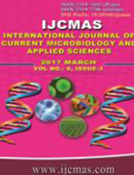


 National Academy of Agricultural Sciences (NAAS)
National Academy of Agricultural Sciences (NAAS)

|
PRINT ISSN : 2319-7692
Online ISSN : 2319-7706 Issues : 12 per year Publisher : Excellent Publishers Email : editorijcmas@gmail.com / submit@ijcmas.com Editor-in-chief: Dr.M.Prakash Index Copernicus ICV 2018: 95.39 NAAS RATING 2020: 5.38 |
Nanobiotechnology is an emerging field of science that utilizes nanobased systems for various biotechnological and biomedical applications. The synthesis of metal and metal oxide nanoparticles has attracted considerable attention, as they have high surface area and high fraction of atoms which is responsible for their fascinating properties such as antimicrobial, magnetic, electronic and catalytic activity. The antibacterial activities of TiO2 nanoparticles were studied in Staphylococcus aureus and Escherichia coli. Treatment of the bacterial cells with TiO2 NP’s resulted in the leakage of reducing sugars, proteins and reduced the activity of the respiratory chain dehydrogenases. In conclusion, the combined results suggested that TiO2 NP’s was found to damage the bacterial cell membrane and depress the activity of some vital enzymes which eventually led to the death of bacterial cells. Thus TiO2 NP’s could be used as an effective antibacterial material in the burgeoning field of Nanomedicine research with tremendous prospects for the improvement of combating human pathogens.
 |
 |
 |
 |
 |